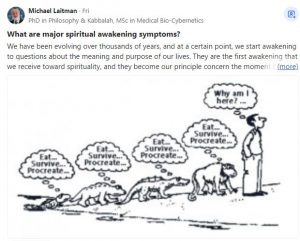
We have been evolving over thousands of years, and at a certain point, we start awakening to questions about the meaning and purpose of our lives. They are the first awakening that we receive toward spirituality, and they become our principle concern the moment that we start rising above our animate existence.
Unlike animals, our desires evolve from one generation to the next. We feel the desires of the next level of evolution, and our sensation of emptiness constantly grows, forcing us to seek new and different kinds of fulfillment to what we previously had. We thus gradually develop a more and more pronounced question about the meaning of life, which increasingly preoccupies us.
Newer and newer ideas surface in us, and we develop increasingly complex systems as a result of our growing unfulfilled desires. Science also develops in relation to the questions we have in each generation, and we can see the vast difference between today’s science and science a few centuries ago.
Moreover, the question about the meaning and purpose of our lives manifests itself first and foremost in certain individuals. Over the course of history, we have been driven to make breakthroughs in several areas, whether it be art, music, literature, poetry, science and technology. Our desires constantly grew according to a scale starting from mere survival necessities—food, sex and family—through to social desires—money, honor, control and knowledge. From one generation to the next, our desires become increasingly refined.
According to the great Kabbalist, the Ari (Rav Isaac Luria), the question about the meaning and purpose of life started emerging in humanity as a whole toward the end of the Middle Ages and the beginning of the Renaissance. The technological, scientific and cultural revolutions in Europe thus became the trigger for the emergence of a totally new attitude to life and religion. Many people started no longer fearing being non-religious and getting punished for dissent, which signaled that desires in humanity grew to a new level where belief started falling short in the new demand for proof that had started evolving.
At the start of the “Introduction to The Study of the Ten Sefirot,” Kabbalist Yehuda Ashlag (Baal HaSulam) wrote:
Indeed, if we set our hearts to answer but one very famous question, I am certain that all these questions and doubts as to whether we should study the wisdom of Kabbalah will vanish from the horizon, and you will look unto their place to find them gone. This indignant question is a question that the whole world asks, namely, ‘What is the meaning of my life?’
We could say that everything unfolding in the world today is due to us not finding an answer to the question about the meaning of life. We can see what humanity engages in and what it leads the world to, and it is all because people fail to understand what they exist for.
We mostly wish to file away the question about the meaning and purpose of life, and instead engage in much more immediate and concrete pleasures, keeping ourselves busy in order to avoid asking the question. It is because the question, if we engage in it without finding an answer, brings us existential suffering in addition to the suffering we experience in relation to our daily survival.
However, the reason that Baal HaSulam discusses the meaning of life in his “Introduction to the Study of the Ten Sefirot” is because he wants to show how we need not have any lofty goals or special thoughts in order to embark on the spiritual path. Very simply, if we feel bad and we do not know why we are alive, and such questions keep surfacing in us making us feel uneasy, and that we need to get these questions answered in order to justify our existence, then we can start taking steps on the spiritual path.
The wisdom of Kabbalah was made specifically for answering the question about the meaning and purpose of life, and it is open to all, regardless of age, gender, background or any other seeming differences.
Based on a Virtual Lesson on January 31, 2016. Written/edited by students of Kabbalist Dr. Michael Laitman.
Featured in Quora